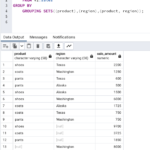 There are a number of useful SHOW commands in MySQL. Sadly, there isn’t one for mysql SHOW USERS nor is there one for mysql LIST USERS. This is a little inconsistent when you consider that there are other commands such as SHOW DATABASES, SHOW VARIABLES, SHOW TABLES, SHOW GRANTS and others.
There are a number of useful SHOW commands in MySQL. Sadly, there isn’t one for mysql SHOW USERS nor is there one for mysql LIST USERS. This is a little inconsistent when you consider that there are other commands such as SHOW DATABASES, SHOW VARIABLES, SHOW TABLES, SHOW GRANTS and others.
However there are ways to do it. You can get back a list of MySQL user accounts by querying the mysql.users table and if you want to find out which privileges each MySQL user has, then this is possible as well.
So let us take a look at what is possible….
Querying mysql.users
You can get back a list of users by running a simple select statement against the mysql.user table.
On my test system, this returns 3 records. As you can see, two of them are for user root.
SELECT * FROM mysql.user;
+------+ | user | +------+ | andy | | root | | root | +------+ 3 rows in set (0.00 sec)
This is because root can connect from multiple hosts.
SELECT user, host FROM mysql.user;
+------+-----------+
| user | host |
+------+-----------+
| andy | {3a76cbff1b5ce5ace3bd34bbdd68f71285d81fb9af60114c7a6db80d3a8688de} |
| root | {3a76cbff1b5ce5ace3bd34bbdd68f71285d81fb9af60114c7a6db80d3a8688de} |
| root | localhost |
+------+-----------+
3 rows in set (0.00 sec)
Show privileges for a specific MySQL user using SHOW GRANTS
In order to do this, you can use SHOW GRANTS
SHOW GRANTS FOR 'root'@'localhost';
+------------------------------------------------------+ | Grants for root@localhost | +------------------------------------------------------+ | GRANT ALL PRIVILEGES ON *.* TO 'root'@'localhost'....| +------------------------------------------------------+ 1 row in set (0.00 sec)
Show user privileges for all MySQL users using SHOW GRANTS
You first have to build up a list of SHOW GRANTS statements for each user in your mysql.users table.
SELECT CONCAT('SHOW GRANTS FOR ''',user,'''@''',host,''';') FROM mysql.user;
This will give you the following output.
+------------------------------------------------------+
| CONCAT('SHOW GRANTS FOR ''',user,'''@''',host,''';') |
+------------------------------------------------------+
| SHOW GRANTS FOR 'andy'@'{3a76cbff1b5ce5ace3bd34bbdd68f71285d81fb9af60114c7a6db80d3a8688de}'; |
| SHOW GRANTS FOR 'root'@'{3a76cbff1b5ce5ace3bd34bbdd68f71285d81fb9af60114c7a6db80d3a8688de}'; |
| SHOW GRANTS FOR 'root'@'localhost'; |
+------------------------------------------------------+
3 rows in set (0.00 sec)
You could copy and paste each statement and execute each line to get a list. That is a bit fiddly and time consuming. One way of achieving this more quickly would be to output the results to a file and then read the file back in line by line.
You can use OUTFILE and SOURCE to do this.
SELECT CONCAT('SHOW GRANTS FOR ''',user,'''@''',host,''';') FROM mysql.user INTO outfile '/tmp/show_grants.txt';
Now read the file you have just produced
SOURCE /tmp/show_grants.txt
Produces the following output.
+--------------------------------------+
| Grants for andy@{3a76cbff1b5ce5ace3bd34bbdd68f71285d81fb9af60114c7a6db80d3a8688de} |
+--------------------------------------+
| GRANT USAGE ON *.* TO 'andy'@'{3a76cbff1b5ce5ace3bd34bbdd68f71285d81fb9af60114c7a6db80d3a8688de}' ....|
+--------------------------------------+
1 row in set (0.00 sec)
+--------------------------------------+
| Grants for root@{3a76cbff1b5ce5ace3bd34bbdd68f71285d81fb9af60114c7a6db80d3a8688de} |
+--------------------------------------+
| GRANT USAGE ON *.* TO 'root'@'{3a76cbff1b5ce5ace3bd34bbdd68f71285d81fb9af60114c7a6db80d3a8688de}' ....|
+--------------------------------------+
1 row in set (0.00 sec)
+-------------------------------------------------------+
| Grants for root@localhost |
+-------------------------------------------------------+
| GRANT ALL PRIVILEGES ON *.* TO 'root'@'localhost' ....|
+-------------------------------------------------------+
1 row in set (0.00 sec)
Using information_schema.user_privileges
Another way to list privileges for users would be to query user_privileges in information_schema
SELECT * FROM information_schema.user_privileges;
+--------------------+---------------+-------------------------+--------------+
| GRANTEE | TABLE_CATALOG | PRIVILEGE_TYPE | IS_GRANTABLE |
+--------------------+---------------+-------------------------+--------------+
| 'root'@'localhost' | NULL | SELECT | YES |
| 'root'@'localhost' | NULL | INSERT | YES |
| 'root'@'localhost' | NULL | UPDATE | YES |
| 'root'@'localhost' | NULL | DELETE | YES |
| 'root'@'localhost' | NULL | CREATE | YES |
| 'root'@'localhost' | NULL | DROP | YES |
| 'root'@'localhost' | NULL | RELOAD | YES |
| 'root'@'localhost' | NULL | SHUTDOWN | YES |
| 'root'@'localhost' | NULL | PROCESS | YES |
| 'root'@'localhost' | NULL | FILE | YES |
| 'root'@'localhost' | NULL | REFERENCES | YES |
| 'root'@'localhost' | NULL | INDEX | YES |
| 'root'@'localhost' | NULL | ALTER | YES |
| 'root'@'localhost' | NULL | SHOW DATABASES | YES |
| 'root'@'localhost' | NULL | SUPER | YES |
| 'root'@'localhost' | NULL | CREATE TEMPORARY TABLES | YES |
| 'root'@'localhost' | NULL | LOCK TABLES | YES |
| 'root'@'localhost' | NULL | EXECUTE | YES |
| 'root'@'localhost' | NULL | REPLICATION SLAVE | YES |
| 'root'@'localhost' | NULL | REPLICATION CLIENT | YES |
| 'root'@'localhost' | NULL | CREATE VIEW | YES |
| 'root'@'localhost' | NULL | SHOW VIEW | YES |
| 'root'@'localhost' | NULL | CREATE ROUTINE | YES |
| 'root'@'localhost' | NULL | ALTER ROUTINE | YES |
| 'root'@'localhost' | NULL | CREATE USER | YES |
| 'root'@'localhost' | NULL | EVENT | YES |
| 'root'@'localhost' | NULL | TRIGGER | YES |
| 'root'@'{3a76cbff1b5ce5ace3bd34bbdd68f71285d81fb9af60114c7a6db80d3a8688de}' | NULL | USAGE | NO |
| 'andy'@'{3a76cbff1b5ce5ace3bd34bbdd68f71285d81fb9af60114c7a6db80d3a8688de}' | NULL | USAGE | NO |
+--------------------+---------------+-------------------------+--------------+
29 rows in set (0.00 sec)


Thank You, very helpful.
Nice idea on how to list all privileges
If you don’t have OUTFILE permissions then you can run it from the command line
mysql **flags to connect** -e”SELECT CONCAT(‘SHOW GRANTS FOR ”’,user,”’@”’,host,”’;’) FROM mysql.user” | awk “NR>1 { print }” | mysql **flags to connect** > /tmp/results.txt